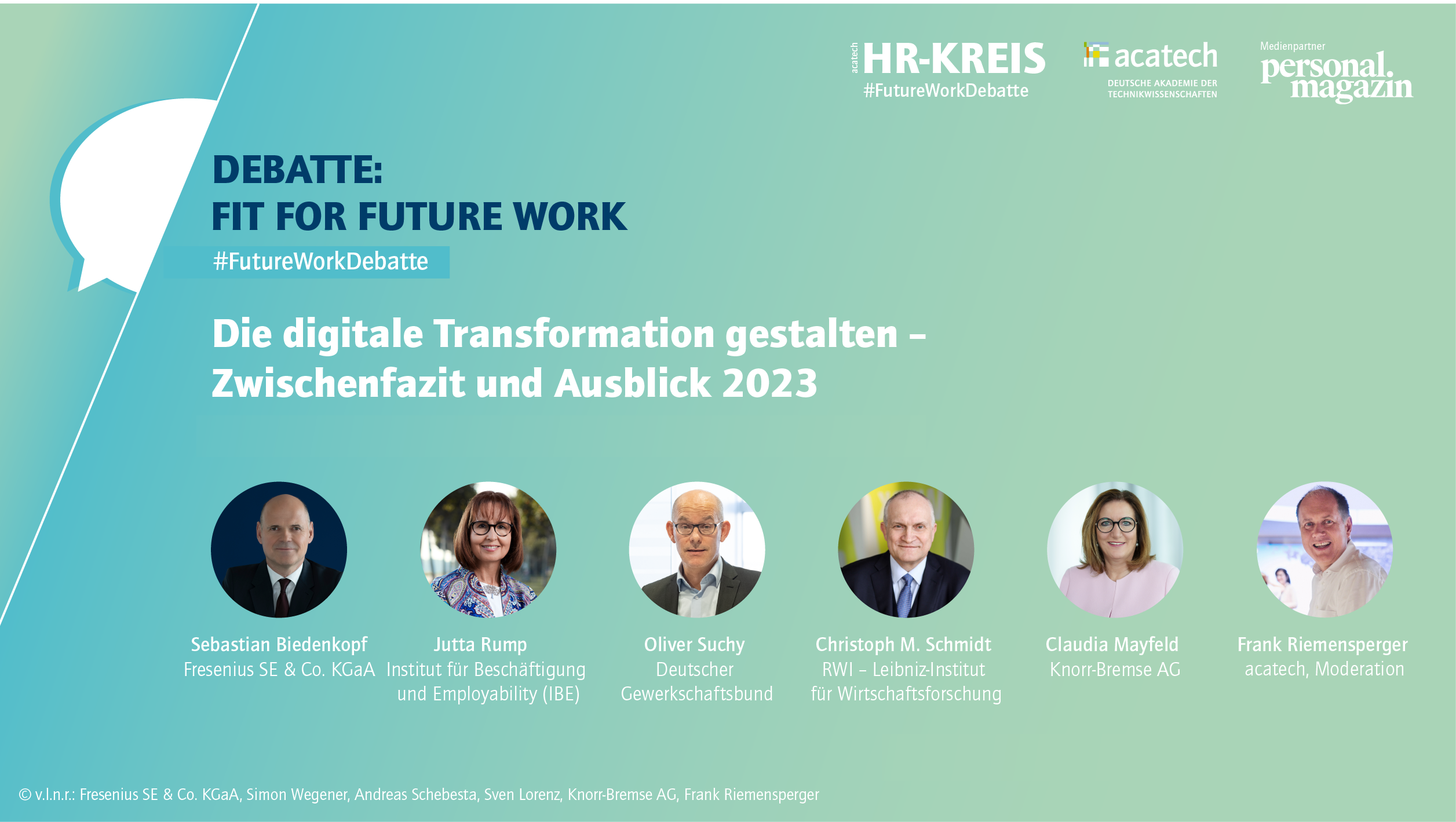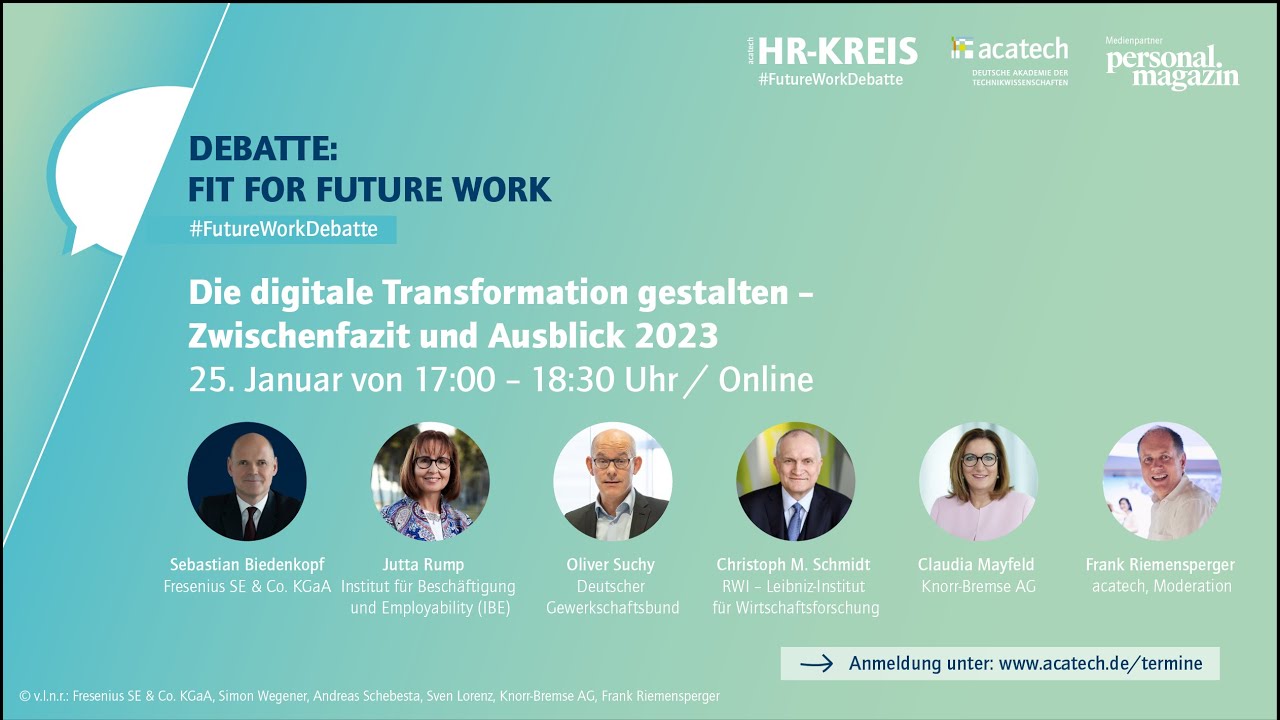Experts discuss acatech’s Human Resources Working Group perspective paper

Munich, 02 February 2023
Up for discussion at the first #FutureWorkDebatte debate of 2023 were six perspectives on the digital transformation of work. The Human Resources Working Group, the acatech forum for Chief Human Resources Officers (CHROs) coordinated by acatech, presented these in December 2022. After an intensive discussion, it was clear at the end of the debate that these perspectives are robust enough to continue the discussion of the future of work around their core substance.
The six perspectives put forward by the Human Resources Working Group concern, for example, the role of CHROs and the establishment of a “Digital Culture” within enterprises. They are the outcome of the first five debates in the virtual debate series #FutureWorkDebatte, which began in summer 2022. At the first debate of 2023 on 25 January, the two hosts of the Human Resources Working Group Frank Riemensperger and Henning Kagermann brought up the perspectives for discussion and, after an intensive debate, the general feeling is that these perspectives are relevant.
Six perspectives on the digital transformation of work
- The digital transformation is a key component of a new kind of competitiveness, resilience and collaboration between companies.
- For the digital transformation to succeed, new solution spaces are required.
- Flash points in the digital transformation must be resolved.
- CHROs will be the driver behind companies’ ability to change.
- “Digital Culture” will become central to the success of the digital transformation.
- Lifelong learning is one of the keys to frame the transformation.
The third perspective in this paper identified the “culture of status quo and risk avoidance” that often exists in German companies as one of the main impediments to the digital transformation in organisations. The attendees on 25 January – including Oliver Suchy from the German Trade Union Confederation (DGB) and Jutta Rump from Institut für Beschäftigung und Employability in Ludwigshafen – agreed that this culture remains very much alive and kicking. In order to change this culture, senior management in particular must directly and personally experience the benefit of digital change processes. They thus become genuine supporters and mediators of change. But as well as senior management, the individual employee must be able to feel a direct benefit, and the goals to be reached as a result of the change must be communicated clearly and transparently.
The world of work is under immense pressure at the moment, said acatech Vice-President Christoph M. Schmidt. He also said that the “three Ss” – size, synchrony and speed of change – are a challenge, and not just for the executive personnel. Companies have to introduce a new culture in relation to defects: different, parallel defect principles are required in a company to, for example, meet the requirements for the transformation and also for production standards. The zero-defect culture – the like of which is essential in the medical and automotive industries – would have to be adapted in the experimental spaces required for the digital transformation, according to Sebastian Biedenkopf, Labor Relations Director at Fresenius SE & Co. KGaA.
Non-industrial organisations could learn from industry how the digital transformation can work well, said the Human Resources Working Group co-host and moderator Frank Riemensperger. “The architecture of digitalisation must be enshrined in the architecture and culture of the organisation. The core elements are a clear benefit for all, plenty of scope to frame the solution, empowering the teams to make the right decision.” Only then could employees shape the digital transformation successfully and in their favour.
There are already lots of positive examples of this; however, the attendees’ view was that there is not much awareness of them yet. For an even broader discussion on the subject of benefits in connection with digitalisation to take place, more publicity is needed – something that acatech’s Human Resources Working Group will also address in future.
Recording of the event (in German)
About the debate series Fit for Future Work
Current impulses from acatech’s Human Resources Working Group are zeroing in on how a good working relationship can work and how digitalisation can go from bugbear and suspected job-killer to an opportunity for good work. In its debate series “Fit for Future Work” (in German) the Human Resources Working Group puts forward its perspectives for public discussion. The latest information and positions surrounding the debate series are available on social media:
#FutureWorkDebatte




